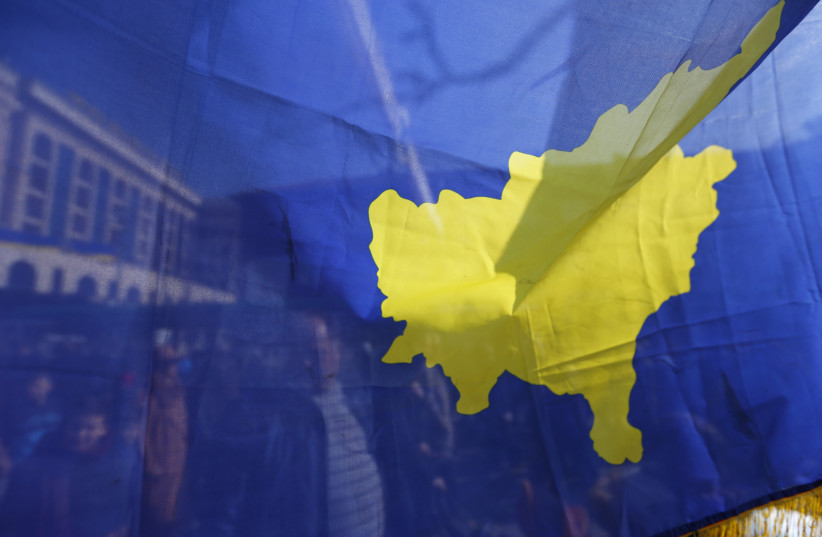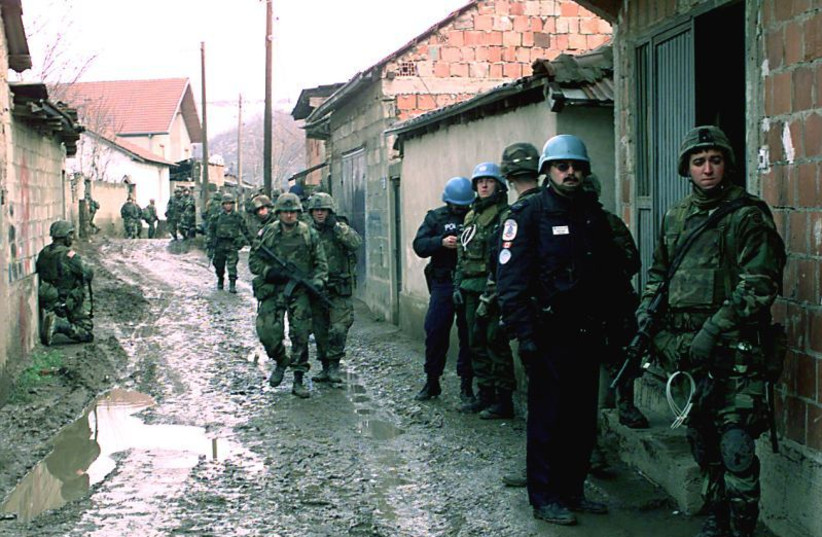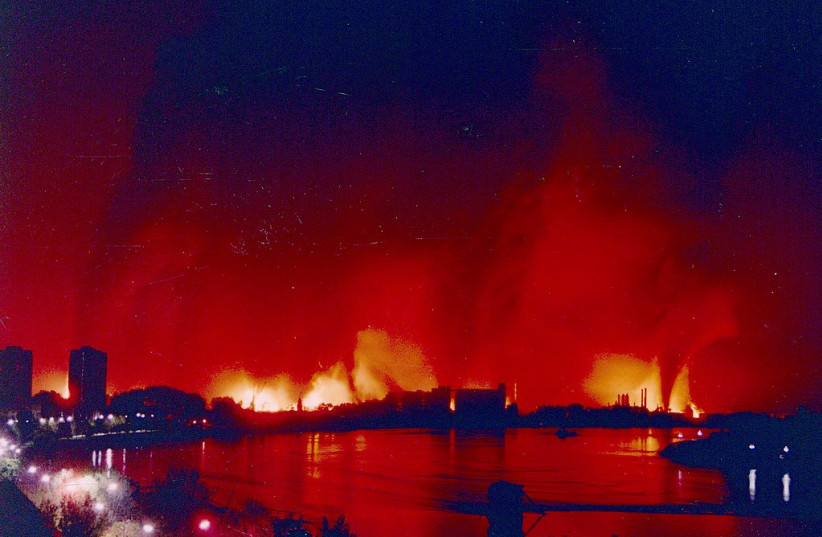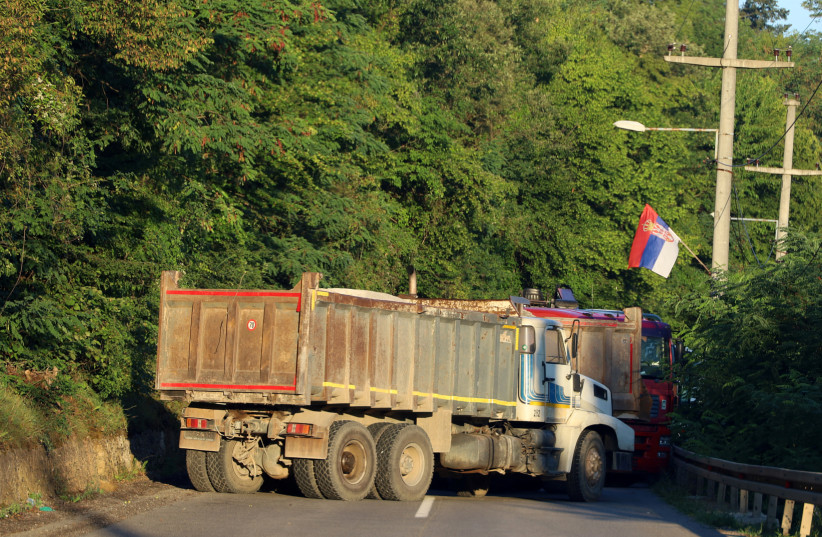Sirens sounded for three hours in the town of Mitrovica in northern Kosovo on Sunday, July 31, as Serb protesters blocked roads and shot at local authorities in the Balkan country.
Kosovar Prime Minister Albin Kurti placed blame on Serbia, its neighbor with which it has had an often tense and antagonistic relationship over the past several years.
But what exactly happened? What is the long and complex history of these Balkan nations? And how are Russia and NATO involved?
Here's what you need to know.

What is Kosovo?
Kosovo is a relatively new nation in the Balkans, having declared independence from Serbia in 2008. Its capital city is Pristina.
To date, its status as an independent country is disputed and it does not have unanimous international recognition.
Its populace, known as Kosovars or Kosovans, is largely ethnically Albanian with Serb, Bosniak and Turk minorities.
The vast majority of its population identifies as Muslim, and its official languages are Albanian and Serbian.
Kosovo's history, like that of the entire Balkan Peninsula, is incredibly complex, featuring a vast number of ethnicities, national identities, religions and languages that have often been subjugated under the rule of a number of greater imperialistic powers such as the Ottoman Empire, the Austro-Hungarian Empire and, later on, Yugoslavia.
<br>What is wrong with the Balkans?
To oversimplify a very complex problem, the Balkans are incredibly diverse, with a great deal of tension over the years between its many ethnic groups, religious groups and nationalities.
This history goes back centuries but an immediate spark can be seen at the start of World War I, which was preceded by a wave of nationalism in the region against the hegemony of the Austro-Hungarian Empire, prompting a Serbian nationalist to assassinate Archduke Franz Ferdinand of Austria.
Tensions between the many demographics in the Balkans continued to escalate even after World War I and during World War II, periodically flaring up into violence. They continued to boil throughout the Cold War and into the 1990s, which sparked a series of brutal conflicts in the region, particularly in Bosnia and Herzegovina and in Kosovo.
What is important to understand is that the Balkans is essentially a major meeting point connecting the Muslim, Roman Catholic and Eastern Orthodox Christian worlds.
Balkan nations in the former Yugoslavia that are largely Orthodox Christians include Serbia, Montenegro and North Macedonia. The majority Catholic nations are Croatia and Slovenia, while the majority Muslim ones are Bosnia and Herzegovina, and Kosovo.
To complicate matters further, minority populations of each ethnic and religious group can be found across the board.
Also, note that despite Kosovars being largely Albanian, the nation of Albania itself was not part of Yugoslavia.
<br>What caused the war in Kosovo?
In the late 19th century, Albanians were expelled from areas that would soon be brought into Serbia. After this, many moved to Kosovo, where conflicts erupted between them and the local Serb population.
These tensions and clashes would continue throughout the 20th century, most notably in the many conflicts between 1912 and 1945, with incidents of persecution and crimes against humanity being carried out against both sides.
In Yugoslavia after World War II, Albanian nationalists at first faced crackdowns but slowly tried to achieve new representation and authority as time went on.
However, in the 1980s, further tensions began to boil between Serbs and Albanians in Kosovo, and more crackdown efforts were launched in the 1990s as Serbia sought to protect Serbs and Serbian interests in the area.
During the 90s, the Balkans erupted into wars throughout Yugoslavia, itself essentially dissolving into several nations.
In particular, the war in Bosnia and Herzegovina was especially brutal, with widespread crimes against humanity including genocide, most notably in the horrific events in Srebrenica.
These tensions further escalated within Kosovo, which saw the establishment of the Kosovo Liberation Army (KLA), a separatist militia that had expressed nationalist goals, at one point even calling for the establishment of a unified nation-state of all Albanian-inhabited lands called Greater Albania.
Complicating matters further was the growing KLA arsenal, which itself was fueled by the chaotic outbreak of the Albanian Civil War and the subsequent looting and pilfering of military stockpiles.
At the time, the KLA had a poor reputation internationally, with both Yugoslavia (then Serbia and Montenegro) and the US State Department considers it a terrorist organization.

What happened in the Kosovo War?
Serbian and Kosovar forces began to clash in the late 1990s, leading to considerable fatalities and accusations of atrocities and war crimes, sparking condemnations from Western nations.
NATO soon became involved in negotiations to end the conflict but this was met with minimal results as the fighting continued to rage throughout the area.
Finally, on March 24, 1999, NATO intervened with a massive bombing campaign.
At the time, the Western military alliance's motivations were described by German chancellor Gerhard Schroder as such: "We are not going to war, but we are called upon to implement a peaceful solution in Kosovo, including by military means!"
"We are not going to war, but we are called upon to implement a peaceful solution in Kosovo, including by military means!"
German chancellor Gerhard Schroder
A NATO spokesperson also described their motivation as "Serbs out, peacekeepers in, refugees back."
The bombing campaign lasted more than a month and a half until June 10, longer than expected as Serbian resistance held out longer than planned. It escalated from simply targeting Yugoslav defenses to striking individual Yugoslav units on the ground.
At one point, it seemed NATO troops would mount a ground assault as well, with British and Norwegian special forces both having reportedly entered Kosovo. Meanwhile, Russian troops also entered the country, with Russia being Yugoslavia's ally, and tensions between Russian and NATO forces were apparent during this time.
Ultimately, however, it was this NATO effort that essentially ended the war, leading to the signing of the Kumanovo Agreement that saw Yugoslav forces pull out.

What's happened since then?
A lot.
For years, Kosovo had a measure of autonomy while still under Serbian rule. However, talks stalled over what would happen next, boiling over in 2004 in a severe outbreak of interethnic violence.
Attempts by the UN Security Council to intervene were stymied by Russia, which holds veto power as one of its five permanent members, because Moscow would only support an outcome that Serbia and Kosovo would agree on.
But in 2008, the Republic of Kosovo eventually declared independence anyway and is currently recognized by just 97 UN nations, including Israel. Technically, 112 nations have recognized Kosovo, but 15 have withdrawn their recognition.
Kosovo is not a member of the United Nations – its independence not being recognized by half of them (96 out of 193), notable among them Russia, China and Serbia.
A NATO mission continues to maintain a presence in Kosovo with 3,770 troops.
Overall, while the situation is much more stable, tensions never truly died out and there remains a great deal of resentment and antagonism between Kosovo and Serbia.

What just happened now?
On July 31, sirens blared in Kosovo and two border crossings with Serbia were closed by police after Serbian protesters reportedly blocked roads and shot at local authorities.
The background of this was of course rooted in the years of tension and antagonism between the two countries.
More immediately, however, it was due to a new rule that anyone with a Serbian ID entering Kosovo would need to replace it with a temporary document while in the country. Notably, this rule isn't unprecedented - Serbia has an inverse version for visiting Kosovars.
But another issue was license plates. Ethnic Serbs in Kosovo with Serbian license plates will be required to change them for Kosovar ones.
Currently, some 50,000 Serbs in northern Kosovo still use license plates and documents issued by Serbian authorities, refusing to recognize the Pristina government and its institutions.
The ongoing tensions have caused Kosovo to postpone this until September 1, though documents are already being handed out.
Currently, the border crossings at Brnjak and Jarinje remain closed as of August 1.
<br>How is Russia involved?
Russia has always been a longstanding ally of Serbia, even amid its ongoing invasion of Ukraine.
Notably, right before the sirens went off, Serbian politician Vladimir Đukanović wrote on Twitter that "Everything seems to me that Serbia will be forced to begin the denazification of the Balkans. I'd like to be wrong." This mirrors rhetoric used by Moscow, which claimed that it wanted to "denazify" Ukraine shortly before launching its invasion of its post-Soviet neighbor in February.
Russia has been vocal about the Kosovar demand for Serbian documents, with Russian Foreign Ministry spokesperson Maria Zakharova saying that the plan to require temporary documents for them "is a step towards their expulsion from Kosovo."
"Russia calls on Pristina and the US and EU behind it to stop provocations and respect the rights of Serbs in Kosovo," she said. "The leaders of the Kosovars know that the Serbs will not remain indifferent when it comes to a direct attack on their freedoms, and deliberately escalate in order to launch a military scenario. Of course, Belgrade is also at the forefront of the attack, which the West wants to additionally 'neutralize' with Kosovo Albanian hands."
"The leaders of the Kosovars know that the Serbs will not remain indifferent when it comes to a direct attack on their freedoms, and deliberately escalate in order to launch a military scenario. Of course, Belgrade is also at the forefront of the attack, which the West wants to additionally 'neutralize' with Kosovo Albanian hands."
Russian Foreign Ministry spokesperson Maria Zakharova
With NATO still maintaining a significant presence in Kosovo and tensions between the West and Russia still high amid the ongoing invasion of Ukraine, it can be expected that these tensions will continue to boil amid the latest events in the volatile Balkan country.
Tzvi Joffre and Reuters contributed to this report.
